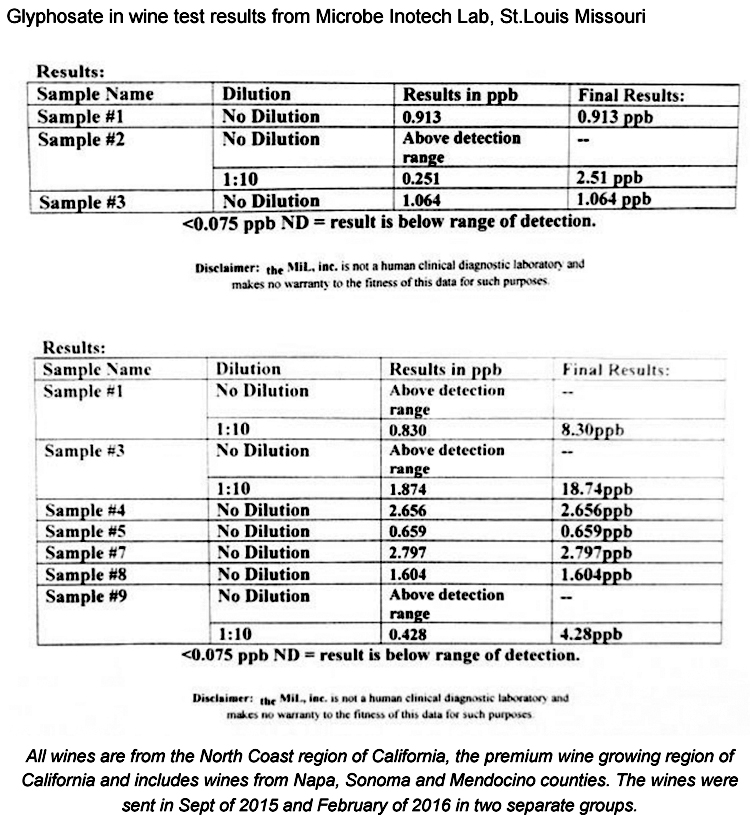Monsanto’s Glyphosate Found in California Wines, Even Wines Made with Organic Grapes
ORGANIC, GMO, GENETIC ENGINEERING, 4 Apr 2016
Zen Honeycutt, EcoWatch – TRANSCEND Media Service
27 Mar 2016 – Shortly after the release of a report showing 14 beers testing positive for glyphosate in Germany, a concerned supporter of Moms Across America approached me at a convention with disturbing news. He said he had test results from Microbe Inotech Lab of St.Louis showing 10 different wines, from large and small vineyards, contained the chemical glyphosate, the active ingredient in Monsanto’s Roundup weedkiller, including wine made with organic grapes.

Test results from Microbe Inotech Lab show 10 different wines contained glyphosate, the active ingredient in Monsanto’s Roundup weedkiller, including wine made with organic grapes.
The contamination of conventional wine was 28 times higher than organic wine, with levels ranging from 0.659 ppb in organic to 18.74 ppb in conventional wine.
The wines tested came from Napa Valley, Sonoma and Mendocino counties in California. The brand names of the wines were not revealed, and frankly, the brands are not the issue. The real issue is the widespread contamination of glyphosate based herbicides in consumer products.
Here are my five reasons why Roundup/glyphosate should never be sprayed on any crops, including vineyards:
- According to farmers, glyphosate based herbicides are likely present in manure/fertilizer from animals fed genetically modifiedgrains. Glyphosate residues have been detected in many foods, beers and wines.
- Wine growers of conventional farms report that their family businesses use to be able to harvest from their vines for 100 years. Today, with chemical farming, vines are lasting 10-12 years. Glyphosate is a chelator, which makes the vital nutrients and minerals of any living thing it touches unavailable. Taking the risk of depleting the vitality of important crops is not a good long term decision for farmers of any kind. Instead, Regenerative agricultureenriches the soil, supports longevity of the farm and does not use toxic chemicals.
- Glyphosate has been deemed a probable carcinogen by the World Health Organization. Even the small amount of 0.1ppt of glyphosate has been shown to stimulate the growth of breast cancer cells. According to the California Department of Health, breast cancer rates in the Sonoma, Napa and Mendocino counties are 10 to 20 percent higher than the national average. There are many pending lawsuitsagainst Monsanto for the connection between non-Hodgkin’s lymphoma and Roundup.
- The pig study by Pedersen and Krueger showed a repeated 30 percent increase of birth defects and stillborn with the introduction of glyphosate-sprayed grains. The infertility and sterility in America is exactly correlated to the pig study results, at 30 percent, the highest in recorded U.S. history.
- French scientist Gilles-Éric Seralini and his team have discovered that the co-formulants of Roundup are 1,000 times more toxic than glyphosate and are hormone disruptors, which can lead to breast cancer, miscarriages, birth defects and many other health issues.
DISCLAIMER: The statements, views and opinions expressed in pieces republished here are solely those of the authors and do not necessarily represent those of TMS. In accordance with title 17 U.S.C. section 107, this material is distributed without profit to those who have expressed a prior interest in receiving the included information for research and educational purposes. TMS has no affiliation whatsoever with the originator of this article nor is TMS endorsed or sponsored by the originator. “GO TO ORIGINAL” links are provided as a convenience to our readers and allow for verification of authenticity. However, as originating pages are often updated by their originating host sites, the versions posted may not match the versions our readers view when clicking the “GO TO ORIGINAL” links. This site contains copyrighted material the use of which has not always been specifically authorized by the copyright owner. We are making such material available in our efforts to advance understanding of environmental, political, human rights, economic, democracy, scientific, and social justice issues, etc. We believe this constitutes a ‘fair use’ of any such copyrighted material as provided for in section 107 of the US Copyright Law. In accordance with Title 17 U.S.C. Section 107, the material on this site is distributed without profit to those who have expressed a prior interest in receiving the included information for research and educational purposes. For more information go to: http://www.law.cornell.edu/uscode/17/107.shtml. If you wish to use copyrighted material from this site for purposes of your own that go beyond ‘fair use’, you must obtain permission from the copyright owner.
Read more
Click here to go to the current weekly digest or pick another article:
ORGANIC, GMO, GENETIC ENGINEERING:
